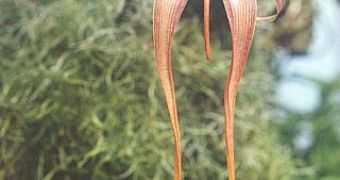Bulbophyllum nocturnu is the first night-flowering amazing orchid discovered by specialist Ed de Vogel in New Britain island, near Papua New Guinea, during one of his usual trips. His finding proves that biodiversity should never be considered a closed chapter, as experts deal with several unknown species of plants and animals every year.
This time, researchers were amazed by the beauty and delicacy of an exquisite nocturnal orchid that closes its petals during the day and reveals its astonishing perfection at night, according to the Independent.
Ed de Vogel collaborated with Andre Schuiteman, an orchid specialist from Royal Botanic Gardens. Both researchers published an article in the Botanical Journal of the Linnean Society, talking about their most recent discovery.
Flowers opening at night are not very common, and so far no orchid listed in the 25,000 species managed to satisfy this condition. Beauty rarely lasts forever and the precious flower doesn't defy this rule. Its nocturnal activity can be spotted during a single night, for only a few hours, so researchers had little time to figure out what is currently influencing the orchid's fate.
Scientists reached the conclusion that Bulbophyllum nocturnum manages to survive due to the contribution of nocturnal insects. Such an orchid would have zero chances of survival in an ecosystem that literally sleeps at night.
This finding is significantly important, since it reveals that people have a lot left to discover, until they know and experience all the nature's wonders hidden in different parts of the globe. Also, time is an essential factor in this equation, as a minute late can turn out to be a minute too late for this kind of discoveries.
Furthermore, Bulbophyllum nocturnu can be found only in primeval tropical forests, according to biologists. The balance of such fragile ecosystems is currently threatened by human intervention, that spares no territories while trying to satisfy the increased global food demand. Unsustainable agricultural practices, correlated with pollution can make researchers say goodbye to this kind of discoveries.
Moreover, appropriate financial support is needed to encourage experts to scale up their efforts in harnessing all that biodiversity has to offer.

 14 DAY TRIAL //
14 DAY TRIAL //